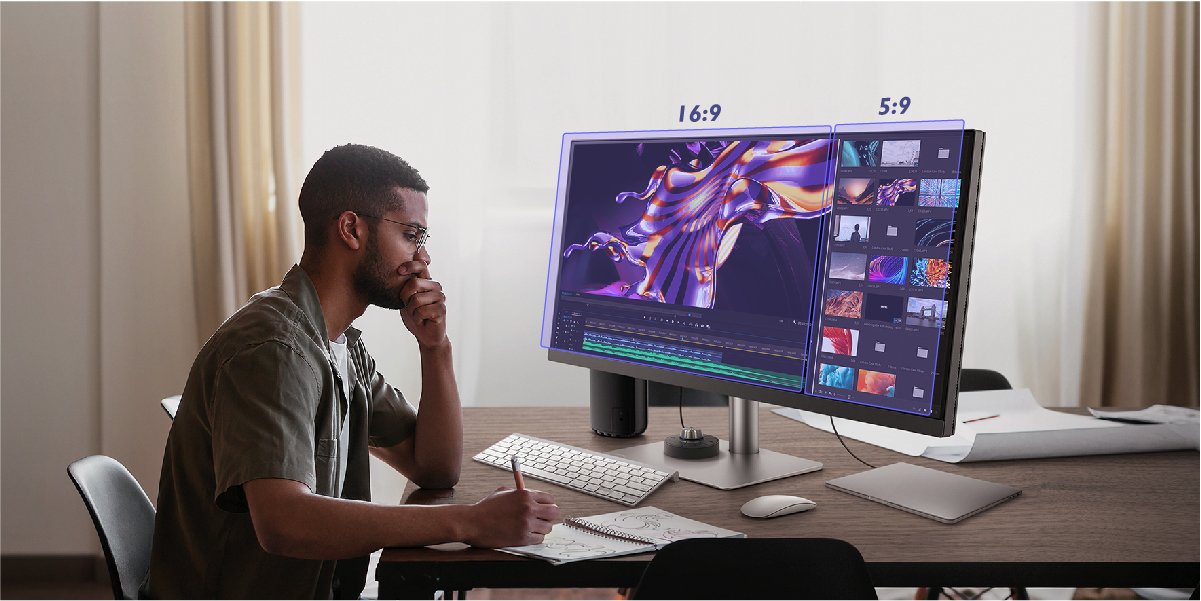

As ultrawide monitors are growing popularity, would you consider buying one? Read this article and find out if you really need an ultrawide.
Whether you are a designer or a video editor, multitasking is part of your everyday work scenario: communicating with your clients and coworkers, image-referencing via a web browser, working on your project with Photoshop or Adobe Premiere, and checking your own image gallery, etc.
If you own a standard monitor, squeezing different applications into one screen and flipping between various applications become a large part of your work routine and this might greatly reduce your productivity. If you happen to have a dual monitor setup with enough screen real estate, then you would need to face issues like poor monitor uniformity, inconsistent color accuracy and uneven image brightness. These are pretty obvious around the corners. If the monitors you have are not bezel-less, this means the bezel gap in the middle of the two monitors would interfere with your creation. What’s more, two monitors take up too much workspace and the result is often a messy desk with cluttered cables. An ultrawide comes in handy to solve these issues.
A monitor with the aspect ratio of 21:9 or above is called an ultrawide, while that of a standard one is 16:9. To give you a better idea, a 34” 21:9 ultrawide monitor equals to a 27” 16:9 monitor with an additional 5:9 screen space. You can start with a 34” ultrawide monitor. To sum up, this extra screen space has made all the difference.
33% extra screen real estate makes multitasking even more convenient with displaying multiple applications on one display at the same time. The need to switch between different applications also declines. Unlike the dual monitor setup, one single large monitor offers great color and brightness uniformity, there would be no color and brightness difference when comparing two images side by side. Without two monitor stands to take up the work space, an ultrawide also guarantees a decluttered desk to give you a clear train of thought when working on your Wacom or sketchbook.

Extra workspace also means that an ultrawide is also suitable for video editing. To see the timeline at a glimpse or gain extra room to open other materials for references assists in saving time and increase productivity. Also, its 21:9 aspect ratio can display video clips in its Cinemascope format (2.35:1) without letterboxing, or the black bars, on the top and bottom. As for designers, various work windows gain enough space to be well arranged on one screen for reference and comparison. Both video editors and designers can work not only with great efficiency but also with superior color performance.
Be sure to find ultrawides with well-designed apps and software, they assist in best utilizing their extra screen real estate. For example, the ultrawides for BenQ DesignVue series offer PBP (picture-by-picture), which can divide the screen into two: 16:9 and 5:9, allowing to display the content from the two sources. Equipped with software Display Pilot, BenQ DesignVue series ultrawides can use Desktop Partition to display the content with the predefined or customized templates, saving your time to resize or drag work spaces. Last but not least, the KVM* function works to switch between two sources with a mouse and keyboard set without effort. Connecting to two operating systems, with one workstation rendering and on the other PC or laptop referencing data and video resources or dealing with any work routine, you can boost productivity without wasting time moving from one operating system to another.
*Only certain models have the KVM function
After delving into the benefits of ultrawides, it’s your call to evaluate whether getting an ultrawide for your creativity is worth it or not. Still, bear this in mind: not just any ultrawides will do. Be sure to find one that provides features to assist in designs and suit your creative purposes well. Then you will greatly benefit from it.